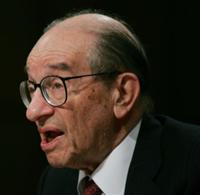Wednesday, June 07, 2006
Oil Prices Are Starting to Affect Economy, Greenspan Tells Senators

Oil Prices Are Starting to Affect Economy, Greenspan Tells Senators
By GREG ROBB and WILLIAM L. WATTS
MarketWatch
June 7, 2006 10:52 a.m.
By GREG ROBB and WILLIAM L. WATTS
MarketWatch
June 7, 2006 10:52 a.m.
WASHINGTON -- Sharply higher oil prices have yet to seriously erode global economic activity, but recent data indicate the U.S. "may finally be experiencing some impact," former Federal Reserve Chairman Alan Greenspan told the Senate Foreign Relations Committee on Wednesday.